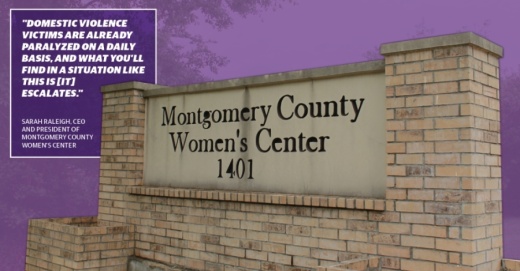For one, the domestic violence caseload and crisis calls are increasing.
The county district attorney’s office reported a 35% increase in domestic violence cases in March compared to March 2019, according to a news release from the DA’s office. Meanwhile, the Montgomery County Women’s Center has seen a 15% increase in the number of hotline calls in that same time: 4,009 versus about 4,600, and not all of the calls from March 2020 have been logged yet, representatives said.
Secondly, current conditions—tense emotions, unemployment and fears of getting sick, all while cooped up inside—make domestic violence situations more likely to escalate, said Echo Hutson, domestic violence chief for the DA’s office.
“When everybody’s home, it’s like a pressure cooker,” she said. “When home is not your safe place and then you’re being ordered to stay home, think of how scary that is.”
And thirdly, victims now have limited resources and safe places to turn to, which makes leaving an abuser—already the most dangerous time for a victim of domestic violence—even more risky, said Sarah Raleigh, CEO and president of the Montgomery County Women’s Center.
The shelter is operating at limited capacity and can only house one woman or one family per room to comply with coronavirus regulations. With travel restrictions in place and shelters at capacity, Raleigh said the length of hotline calls have also increased as victims discuss their options, or lack of options, with crisis workers.
“I think they’re scared on so many more levels,” Raleigh said. “We had the same person call in six different times, and while it’s not unusual to have repeated calls, I think it’s a little unusual in two hours.”
So what should you do if you are ordered to stay home but your home is unsafe?
Advocates urge individuals to take advantage of hotlines and virtual resources, which are shown in this graphic. Authorities are also enacting stricter punishments for perpetrators in the hopes of deterring violence.

The perfect storm
Schools closed. Businesses and restaurants shut down. Residents were ordered to stay at home. It is, as Debi Edge, the chief program officer for the county women’s center, put it, “the perfect storm” for domestic violence.
“There is a well-known correlation,” Raleigh said. “Anytime you find additional stress in the home, typically domestic violence escalates, and this is certainly a stressful time.”
Raleigh said the last time she recalls seeing such a noticeable uptick in call volume was during the economic downturn of 2007 and 2008. Between those years, the shelter’s call volume rose from 1,500 per month to 3,000 per month.
Hutson, who is tasked with reviewing the county’s domestic violence cases that roll in each day, said she looks at various factors to assess the severity of the case, such as: Does the perpetrator have a criminal background? Are there threats of homicide? Is this a reoccurring or a first-time incident? And, has there been a recent job loss?
“[Unemployment] seems to be one of those things that is typically relevant to whether violence is likely to occur or escalate,” she said. “I think right now, that factor has increased. ... I do see that in our cases right now.”
Statewide, unemployment is rising as businesses are forced to shutter their doors and lay off employees. The Texas Workforce Commission has seen an exponential increase in unemployment insurance claims, of which about 33,000 are filed on a daily basis in recent weeks, TWC Executive Director Ed Serna said in a Facebook Live event March 25.
The unstable economy coupled with fear of the virus itself has heightened the situation, Raleigh said.
“We do see that the fear of being turned out is greater right now,” Raleigh said. “A number of clients who called the hotline have said their abusers have threatened to lock them out, threatened to drop them off on a busy street. ... While that’s always an incredibly frightening threat, now there’s a level of terror that people can’t possibly imagine."
And the number of domestic violence cases countywide is likely much higher than what is reported, particularly now, Hutson said.
“A lot of times in a domestic violence situation it is actually a friend, coworker or teacher who is actually reporting the violence,” she said. “Right now, when you have that isolated situation, we don’t know how many are [in danger].”
Crime and punishment
Normally, the Montgomery County Women’s Center houses 70 women and children per day. But now, it can only house one woman or one family per room and has had to turn people away, Raleigh said. And immune-compromised or elderly individuals may still opt to stay in dangerous situations at home rather than a communal living space, she said.
But the center is still operating its crisis hotline, and all of its services are still operating in some capacity—many virtually. It is also hosting virtual sexual assault education during April on its Facebook page.
Meanwhile, the district attorney’s office will pursue all disaster enhancements, which increase the minimum range of punishment on certain assault offenses, for offenders who commit domestic violence offenses, according to a news release. The enhancements will either increase the minimum days in jail or increase the charge itself to a higher-level offense.
“If you are going to hurt somebody and you’re going to take advantage of this situation, then we are going to take that more seriously now because our community is so much more at risk,” Hutson said.





